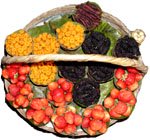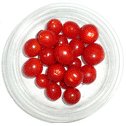Fruit Nutrition facts
Welcome to Fruit Nutrition Facts information page!
Why Choose Fruits?

Fruits represent nature's remarkable gift to humanity, serving as life-enhancing remedies rich in vitamins, minerals, antioxidants, and numerous phytonutrients (micronutrients derived from plants). They captivate our senses, not only with their vibrant colors and delightful flavors but also with their distinctive nutritional composition that promotes fitness, rejuvenation, and overall well-being while guarding against diseases!
Here is an impressive list of fruits with detailed illustrations of their health benefits and nutrition facts:
Fruits are not only low in calories and fat but also rich sources of simple sugars, fiber, and essential vitamins that play a crucial role in optimizing our health.
Fruits are abundant in soluble dietary fiber, aiding in the removal of cholesterol and fats from the body while promoting regular bowel movements and offering relief from constipation.
Within fruits lie a plethora of antioxidants, including polyphenolic flavonoids, vitamin C, and anthocyanins. These compounds serve a dual purpose: firstly, shielding the human body from oxidative stress, diseases, and cancers, and secondly, enhancing the body's ability to combat these ailments by bolstering our immune system. Compared to vegetables and cereals, many fruits boast remarkably high antioxidant values, measured by their "Oxygen Radical Absorbent Capacity" (ORAC).
Anthocyanins, a subcategory of flavonoid polyphenols, are present in "blue-fruits" like blue-black grapes, mulberries, acai berries, chokeberries, blueberries, and blackberries, as well as various vegetables sporting blue or deep purple pigments. The consumption of fruits rich in blue pigments offers numerous health benefits. These compounds possess potent antioxidant properties that effectively eliminate free radicals from the body, thereby offering protection against cancers, aging, and infections. Most of these pigments in fruits tend to concentrate just beneath their skin.
The health-promoting qualities of fruits stem from their wealth of vitamins, minerals, micro-nutrients, and pigment antioxidants. Together, these compounds shield the body from damage, rejuvenate cells, tissues, and organs, and either prevent or delay the natural aging process.
The benefits of incorporating fruits into your daily diet are manifold, ranging from preventing minor issues like skin wrinkling, hair loss, and memory decline to averting major diseases such as age-related macular degeneration (AMRD), Alzheimer's disease, colon cancers, weak bones (osteoporosis), and many more. The list of fruit nutrition benefits is seemingly endless!
Dry fruits
Dry fruits are a rich source of nutrients such as vitamins and minerals. Consumption of some dry fruits daily enhances the overall bioavailability of nutrients.
Dry fruits like raisins (dried grapes), goji berry, apricots, dates, figs, tamarind..., are indeed very good in iron, calcium, zinc, selenium and manganese. Also, mixing dry fruits with some fresh fruits would help you get vitamin-C which in turn facilitates complete absorption of iron inside the stomach.

What is the recommended daily intake of fruit nutrition?
Research studies suggest that it is advisable to consume multiple servings of fruits daily, with a minimum recommendation of 2-3 servings of fresh fruits each day.
A single fruit serving typically equates to about 250 g of the fruit's cleaned "edible-portion," excluding parts like the peel and seeds.
It is beneficial to incorporate a variety of seasonal fruits into your daily diet. This diversity can include different fruit types such as tropical fruits, sub-arctic berries, and tree fruits, as well as fruits of various colors like blueberries, mangoes, pink guava, yellow watermelon, black grapes, and black sapodilla. Emphasizing different flavors and colors can help maximize the health benefits derived from fruit consumption. For instance, yellow and orange-colored fruits are abundant sources of a and ß carotenes, zeaxanthin, and cryptoxanthin, while fruits with blue or black hues, such as blackberries and blueberries, offer excellent supplies of polyphenolic anthocyanin antioxidants.
Selection of fruits
Opt for organic produce over conventional options to maximize the nutritional benefits of fruits. Many wild varieties of berries and tropical tree fruits are naturally grown without the use of chemical fertilizers or insecticides, making them a safe choice when purchased from local farm owners. While organic fruits may be smaller and more expensive, they boast a unique flavor, are rich in vitamins and minerals, and are packed with health-enhancing antioxidants.
When shopping in a store, prioritize fruits that exhibit freshness, vibrant colors, and flavorful aromas, while feeling weighty in your hands. Be vigilant for any blemishes, spots, molds, or signs of pesticide residue. Opt for whole fruits instead of pre-cut sections, such as choosing a small-sized watermelon instead of a pre-sliced portion.
How to consume fruits?
With the exception of a few fruits like wild berries, it's essential to promptly wash your fruits after purchasing them. Begin by soaking them in saltwater for a few minutes, followed by a thorough rinse under cold running water until you are satisfied with their cleanliness. This process ensures that the fruits you consume are free from dirt, sand, and any lingering chemical residues.
It's best to enjoy them while they are still fresh, as certain fruits have a limited shelf life, and their health-enhancing properties diminish over time. For storage, place them in paper wrappings or sealed pouches and keep them in the refrigerator for short durations until you are ready to use them.
To fully savor their genuine flavor and maximize their nutritional benefits, consume fruits in their natural state without any additional ingredients or modifications.
Read further on:
≺≺- EWG's- The Clean Fifteen: Fruits and Vegetables with the Lowest Pesticide Levels.≺≺ How Shopping at Farmers' Markets Benefits Your Health?
≺≺- Fruit peel nutrition facts and health benefits.
≻≻-Back to Home page from Fruit Nutrition.












































